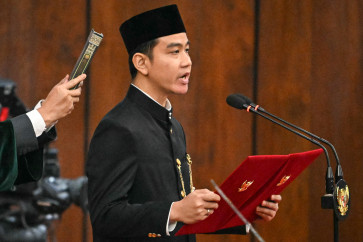Expert says nonmarital sex allowed, then retracts
Does the Quran allow Muslims to have sex outside of marriage? Sunan Kalijaga Islamic State University (UIN Sunan Kalijaga) doctoral candidate Abdul Aziz’s answer to that question seemed to be yes, but following an uproar from conservative Muslims, he has backed off his stance
Change text size
Gift Premium Articles
to Anyone

D
oes the Quran allow Muslims to have sex outside of marriage? Sunan Kalijaga Islamic State University (UIN Sunan Kalijaga) doctoral candidate Abdul Aziz’s answer to that question seemed to be yes, but following an uproar from conservative Muslims, he has backed off his stance.
Aziz’s dissertation, which argues that nonmarital sex is permitted under Islamic law, caught media attention after he completed his doctoral defense last Wednesday.
"Sexual intercourse, both marital and nonmarital, is a sexual human right that is protected by the state. In Islamic legal tradition, however, it is marital intercourse that is legal, while nonmarital intercourse is not," Aziz wrote in the dissertation’s abstract. "This study aims to discover a new theory that can be used to justify the legality of nonmarital intercourse."
Initially, the dissertation seemed to gain a positive response, with Aziz’s examiners giving him a "very satisfactory” grade.
The public attention, however, has attracted critics, and the examiners instructed him to revise his dissertation on Friday.
The Indonesian Ulema Council (MUI) has also weighed in, saying that the dissertation "fell into the category of distorted thinking" and should be rejected because it could "damage the [Muslim] community’s and the nation’s morals".
"[We] ask all people, particularly Muslims, not to follow that opinion because it could lead to acts that are forbidden by religious law," MUI secretary-general Anwar Abbas said in a statement on Tuesday.
Aziz himself has agreed to revise the dissertation and "remove several controversial sections".
"I apologize to the Muslim faithful because of the controversy created because of my dissertation", he told reporters on Tuesday.
The controversy comes amid a push to pass the revised Criminal Code bill, which outlaws consensual sex between two unmarried people, with a maximum punishment of one year's imprisonment and a fine of up to Rp 10 million (US$ 707.72). The bill represents an expansion of the definition of adultery from the current Criminal Code, which only prohibits married persons from having extramarital sex.
The dissertation hinges on the term milk al-yamin (what one's right hand possesses), which has been traditionally interpreted to mean household slaves.
Several verses in the Quran allow men to have sexual intercourse with "what [their] right hand possesses" in addition to their wives.
In the dissertation, Aziz examines Syrian writer and thinker Muhammad Shahrur's argument that since slavery is no longer allowed or accepted in contemporary society, the term milk al-yamin should be applied to consensual
nonmarital sex.
Shahrur himself is a controversial figure in Islamic scholarship, with his ideas attracting the ire of several traditional scholars from Egypt’s Al-Azhar University.
"If we insist on saying that the phrase ‘what their right hands possess’ refers to slaves, we risk having to admit that this part of the book is today no longer relevant," Shahrur wrote in his book The Quran, Morality and Critical Reason. "This, however, would contradict the axiomatic truth that Muhammad’s message is eternally valid for all times."
In a response to a commenter on his website, cited by Aziz, Shahrur defines milk al-yamin as "a contract that includes an agreement on a sexual relationship, so that the parties will comply with what they have agreed on".
Shahrur also defined adultery in a much narrower sense than traditional Muslim scholars, saying that nonmarital sexual intercourse should only be considered adultery in the case of a married woman having sexual relations with someone other than her husband or if the intercourse is conducted in public.
Shahrur has often criticized mainstream Islamic scholars’ interpretation of milk al-yamin and adultery, saying that they seemed to prefer force over consent.
Aziz argued that Shahrur’s conception of milk al-yamin would help delegalize the institution of slavery in Islamic legal systems and would help achieve Islam’s mission to "free humanity from the chains of oppression".
At the end of the dissertation, Aziz recommended that Islamic law and Indonesian family law be updated to accommodate Shahrur’s concepts, including by legalizing nonmarital sex.
UIN Sunan Kalijaga’s postgraduate program director Noorhaidi said the dissertation should be revised in light of the criticism regarding "ethics and norms that are part of the public’s common sense".
He said the request for a revision did not violate the principle of academic freedom because the public could still read about the milk al-yamin concept in Aziz’s dissertation. "The problem is his recommendations, which overstep his capacity as a scholar," Noorhaidi said.









